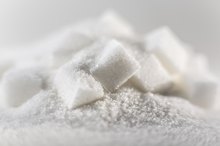Sugar's Effects on Digestion
Sugar provides both health benefits and negative consequences. It supplies an important source of energy that is easy for the body to metabolize and use. However, if you consume large amounts of sugar, you can increase your risk of obesity and the complications it can cause such as diabetes and heart disease. The effects of sugar come about because of how the body digests and then uses it.
Types of Sugar
There are several types of sugar, each which may have different effects on digestion and other parts of the body closely tied to digestion. Each varies in its chemical structure, which accounts for the various effects. Sucrose is common table sugar. Other types include fructose in fruits and lactose in milk. You will also find man-made products including high-fructose corn syrup, corn sweetener and molasses. In addition, there are a host of artificial sweeteners including aspartame and saccharin.
Digestion
The Side Effects of Sucrose
Learn More
Sugars are broken down by enzymes specific to the type of sugar. For example, lactase digests lactose and maltase digests maltose. Sucrose is metabolized in the small intestine by an enzyme that breaks it down into glucose and fructose. Glucose is the form of sugar circulating in your bloodstream that is controlled by the pancreas. When you consume sugar-containing foods, your body releases insulin to store the excess amounts. Sugar provides a vital source of energy, which explains why the body tries to store excess dietary intake.
Fructose Effects
Consuming beverages containing fructose may impair healthy digestion. A study by the University of California, published in the May 2009 issue of the “Journal of Clinical Investigation,” found that the body handles glucose and fructose very differently. Researchers explained that the human body has biological mechanisms for handling glucose. Fructose on the other hand, increased fat or lipid formation. It also decreased insulin sensitivity. This means that the body became increasingly resistant to the effects of insulin to lower blood sugar. This is a major risk for developing diabetes.
Blood Sugar
Advantages & Disadvantages of Sugar
Learn More
Another effect of sugar on digestion concerns its effects on blood glucose levels. When you ingest sugar-containing foods, digestion releases sugar into your bloodstream. If your blood sugar levels spike, it can cause increased thirst and nausea. Likewise, if your blood sugar spikes, you may experience headaches or dizziness. It can also trigger your appetite, which can lead to overeating. Your body releases a hormone that stimulates your appetite when your blood sugar levels and the energy they provide drop below normal levels. Your sugar-rich diet can set the stage for weight gain.
Related Articles
References
Writer Bio
Chris Dinesen Rogers has been online marketing for more than eight years. She has grown her own art business through SEO and social media and is a consultant specializing in SEO and website development. Her past work experience includes teaching pre-nursing students beginning biology, human anatomy and physiology. Rogers's more than 10 years in conservation makes her equally at home in the outdoors.









